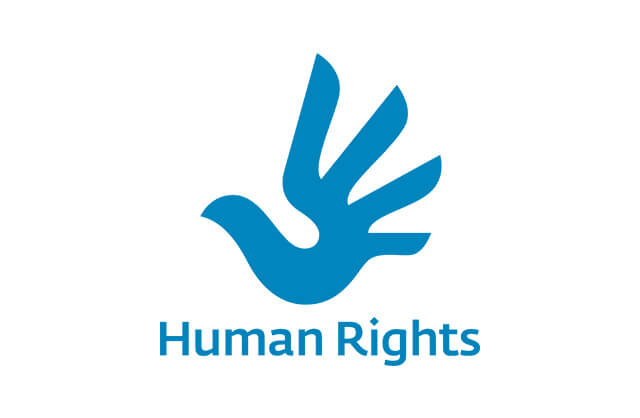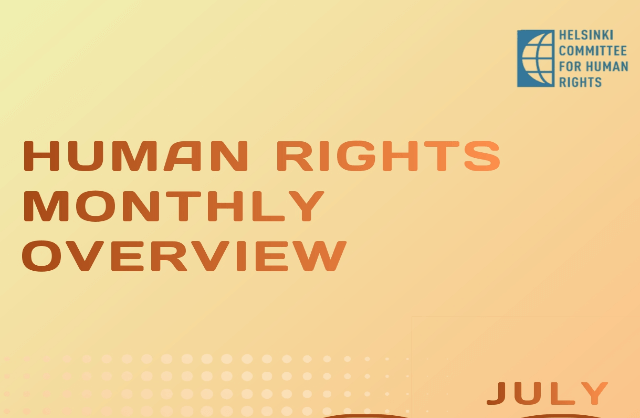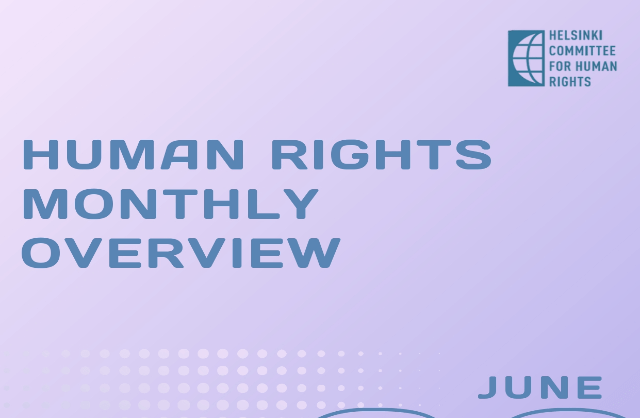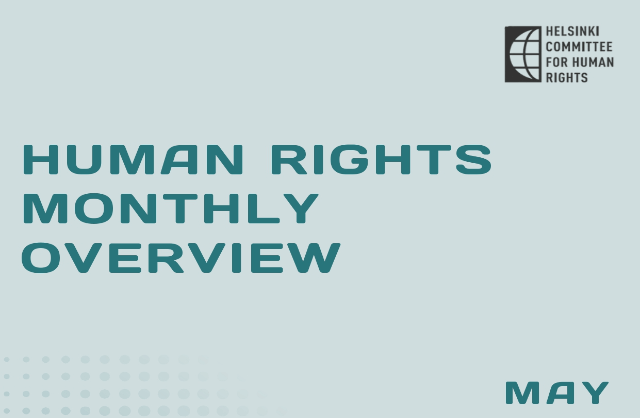Monthly report on Human Rights – June, 2017
July 24, 2017

The monthly report on the human rights situation in the Republic of Macedonia for June, 2017 covers topics from the following areas: Special Public Prosecutor’s Office, Discrimination, Closed Institutions, Hate Speech and Textile Workers.
You can download the monthly report from the following link.
SPECIAL PUBLIC PROSECUTOR`A OFFICE
NEW CHARGES AND REQUESTS FOR PROTECTION OF LEGALITY
SPO submits a Request for protection of legality in the “Talir” case SPO submitted a request for protection of legality to the Supreme Court regarding the “Talir” case which involves the financing of the biggest opposition political party VMRO-DPMNE.[1] As stated in the public notice, the request for protection of legality requires that the Supreme Court finds the decision of the Criminal Council of the Department for Organized Crime and Corruption of the Basic Court Skopje I Skopje, which denied the request of the Public Prosecutpr’s Office for securing a part of the property of political party, as illegal. SPO pointed out that on May 22 of this year, the Public Prosecutor’s Office filed a motion for temporary seizure of property for the purpose of securing, i.e. for determining a temporary measure ‒ prohibition of alienation of real estate by placing a mortgage on that property on grounds of reasonable suspicion that it originates from a criminal offense ‒ Abuse of official position and authorization, which was refused.
SPO stated that the Request for the Protection of Legality pointed to the necessity of interpreting the Law on Financing of Political Parties in accordance with the international standards, on the basis of which this Law was adopted. It also pointed to the circumstance that restrictive interpretation of the first instance court of the said law contradicts the efforts to prevent corruption as a necessary condition for building a democratic society and respecting the principle of the rule of law.
On 19.06.2017, the Supreme Court was scheduled to discuss two other requests for protection of the legality filed by SPO (concerning the Mayor of Pustec, Edmond Temelko, and for the Mayor of Bitola, Vladimir Talevski), which were decided upon once, but after the change of the Criminal Council, are being reopened. The third request, referring to the only convicted in the case “Putsch”, Zvonko Kostovski, has not yet been put on the agenda because the case is in the Council of Public Prosecutors and not all the records about this case have been submitted to the Supreme Court.
SPO filed charges one day before the deadline expiry and requires detention for leading politicians
The Special Public Prosecutor’s Office filed charges against 94 natural persons and 7 legal entities for a series of crimes discovered in wiretapped conversations, informs the head of the SPO, Katica Janeva, in a news conference. Janeva expects all cases to be taken over by the courts in an urgent procedure and begin to decide within 24 hours. For most of the defendants, the SPO will seek detention, and among them, there is a president of a political party, but also other high, current and formerofficials. Altogether, 17 indictments have been filed and considering that three cases have already been processed, the total number of indictments is 20.
Prosecutor Katica Janeva announced that she expects all indictments to be processed in an urgent procedure, requiring detention for the majority of defendants.[2]
From the previously announced investigations, charges have not been filed for the “Talir” and “Tabla” cases, while the “Target” and “Tvrdina” cases have been merged into one case. Janeva stated that for the first case, there was not enough time to complete the investigation because the 8-year illegal funding of the party could not be investigated in 1 month. As for the “Tabla” case, the prosecutor’s office informed that it was still in procedure and was expanded ‒ includes other senior officials. Janeva said that “for the time being”, there are no charges for senior officials of the ruling DUI political party.
Regarding the assumption of jurisdiction over the “Monstrum” case, the prosecutor accused the Council of Public Prosecutors of “non-cooperation”, because of which the insight in the case was not possible and the establishment of SPO’s jurisdiction was not confirmed. Janeva informed that the SPO has not examined 55% of the wiretapped conversations obtained from the SDSM, and not all of already heard ones have been analyzed. Commenting on the completion of the work deadline for the SPO, Janeva expressed hope that a legal way for extending the mandate will be found. She let the public know that that day did not change anything in the fact that this Public Prosecutor’s Office, as a professional and independent institution, will continue working through independent and thorough investigations in appropriate legal procedures to ensure justice.
RECOMMENDATION:
The Helsinki Committee recommends that the parties which have representatives in the legislature ‒ the Parliament of the Republic of Macedonia ‒ reach a consensus on the extension of the mandate of the Special Public Prosecutor’s Office as soon as possible since it is a reform priority of the state. The extension of the mandate necessary for Macedonia to restore the rule of law as a fundamental value of society. We also emphasize what has been highlighted on many occasions in the past, that is, judiciary bodies, public administration and the private sector should all be prepared to offer information necessary for the conducting of this Prosecution Office’s investigations. This recommendation also applies to the Council of Public Prosecutors, which Janeva has accused of “non-cooperation” with regard to the assumption of jurisdiction over the “Monstrum” case. Prosecutor Janeva argues that the Council does not allow inspection of the case which would lead to the assumption of jurisdiction. We would like to point out that according to the Law on Special Public Prosecutors, this prosecutor’s office has exclusive competence for all cases that are related and arise from the content of the illegal interception of communications.
DISCRIMINATION
RECOMMENDATIONS FOR LEGAL CHANGES REGARDING PERSONS WITH DISABILITIES
During the month of June, The Helsinki Committee expressed its support and joined the Citizens’ Initiative “5to12”, which fights for equal rights for people with disabilities. The “5to12” initiative is fighting for strategic, long-term solutions for the inclusion and integration of people with disabilities in all spheres of social life, including healthcare, sports, education, science, and employment. The support that the Helsinki Committee gave to this initiative, among other things, was in the legal drafting of recommendations for amending legal decision in several laws from several different areas, including education, health, social protection, and employment.[3] Recommendations regarding education were aimed at amending several laws and bylaws, which would improve the conditions for education of persons with disabilities and increase their inclusion in education. In the requirements, special attention is paid to the need for individually customized curricula, customized textbooks, adjusted and accessible school buildings, well-trained special education teachers in all schools, and several other changes.
Regarding social protection, the recommendations refer to the redefinition of the notion of disability in the laws, the adoption of a new Law on Personal Assistance, a new approach to the categorization of persons with disabilities, elimination of age limits for exercising rights to benefits on the basis of disability, adjustment of institutions in terms of accessibility, etc.
In terms of health care, the recommendations are aimed at predicting disability as a basis for discrimination, introducing in-service training for medical personnel, employing a speech therapist in all healthcare institutions, providing unlimited access to all health institutions, continuous use of orthopedic devices without age restrictions, etc.
In the area of employment, we gave recommendations for adopting a new Law on Employment of Persons with Disabilities, introducing a system of professional rehabilitation, reviewing the criterion of general health ability as one of the employment conditions, and many other recommendations.
RECOMMENDATION:
Since there are ongoing meetings with the competent ministries for presentation of the requirements and recommendations of the civil initiative and the conditions for their implementation and future legislative changes, we hope that through the establishment of work groups that will draft the amendments in detail, legal changes will be made to improve the status of persons with disabilities.
CLOSED INSTITUTIONS
PROTECTION OF HUMAN PERSONALITY AND DIGNITY IN CLOSED INSTITUTIONS
A dozen convicted persons serving prison sentences in penitentiary institutions in Macedonia have addressed the Helsinki Committee for Human Rights of the Republic of Macedonia.
They complained about the bad conditions and the inappropriate treatment they receive in the penitentiary institutions as convicts, but also about the inability to receive medical care and treatment at those institutions. Pursuant to Article 45, paragraph 2 of the Law on Execution of Sanctions, the implementation of discipline in the institution of imprisonment shall be exercised strictly, but also with the respect of the human personality. Pursuant to Article 46 and Article 124 of the same law, the convicts shall be provided with healthcare, medical assistance and hospital treatment. The penitentiary institutions are obliged to act in accordance with the Law, while the Directorate for Execution of Sanctions, with direct supervision and information, monitors and studies the application of regulations for the execution of sanctions, shall directly undertake or propose measures for improvement of the conditions for executing sanctions to competent bodies. The Directorate’s inspectors perform expert instructor supervision over the institutions’ work, which includes supervising the treatment, security and conditions of the convicts serving prison sentences. If irregularities are identified during the supervision, the director of the Directorate for Execution of Sanctions shall issue an order for their elimination.
Many of the convicts who are turned to the Helsinki Committee requested a visit from Helsinki Committee representatives in order to explain the reasons why they feel that their rights have been violated while serving the prison sentence. The Helsinki Committee regularly submits requests for visits to the Directorate for Execution of Sanctions, in accordance with Article 149, paragraph 4, Law on Execution of Sanctions, with detailed explanations for the purpose of the visits, however, the Directorate persistently ignores and fails to review the requests.
RECOMMENDATION:
Penitentiary institutions should be aware that it is crucially important to respect the provisions of the Law on Execution of Sanctions, especially the ones pertaining to the protection of human personality and dignity, while also taking into account the purpose of particular sanctions. The Directorate for Execution of Sanctions, as a competent institution, should fulfill the legally prescribed obligations regarding the supervision over the execution of sanctions, which can significantly contribute to reaching the contemporary penological standards for promoting and developing the system for execution of sanctions.
HATE SPEECH
SEXUAL ORIENTATION AND GENDER IDENTITY AS MOST COMMON BASES FOR HATE SPEECH
During June 2017, the Helsinki Committee noted a serious increase in the occurrence of hate speech based on sexual orientation and gender identity and registered six hate speech charges on these grounds. This is associated with two events that marked the occurrence and frequency of hate speech in this period, i.e. the news about the first sex change operation performed in the Republic of Macedonia and the holding of the Pride Weekend events.
The news on numerous media reports about the first sex change operation at the private hospital “Adjibadem Sistina” was followed by offensive comments and comments containing hate speech based on gender identity on social networks. The comments are filled with humiliation, insults and degradation of transgender people, calling them “mentally ill”, “madmen” and “freaks of nature”. The intensity of hate speech reached a more serious level, calling for the extermination of transgender people since they should not exist. The Helsinki Committee strongly condemns these comments of hate speech, which can easily provoke hate crimes.
This year, for the fourth time in the Republic of Macedonia, a series of events were organized within the Pride Weekend. Sharing information about events, as well as publicly expressed support for the LGBTI community by public figures, has caused the occurrence of hate speech on social networks. One such example is Milenko Nedelkovski’s share of a video in which actor Sasko Kocev expresses his attitude. That Facebook post was accompanied by a significant number of hate speech comments that, in addition to insults and degradation, included calls for violence against the LGBTI community.
RECOMMENDATION 1:
The Helsinki Committee urges all media and internet portals to monitor and remove comments on their post on social networks containing hate speech. Media and internet portals have a legal obligation and are held criminally liable if they tolerate the spread of hate speech to their published news.
RECOMMENDATION 2:
The Helsinki Committee calls on the Ministry of Internal Affairs, i.e. the Sector for Cybercrime and Digital Forensics, to monitor cases of spreading hate speech, which is a crime, and to prosecute perpetrators accordingly.
TEXTILE WORKERS
THE INSPECTORATE IS NOT FAMILIAR WITH AND FAILS TO IMPLEMENT THE LAW
The Helsinki Committee for Human Rights filed a request for conducting inspection supervision in a textile factory in Stip which has not paid its employees an annual holiday leave pay for the past 2016. After the inspection was carried out, we were informed by the competent inspectorate that the inspectorate had been on the field and had found that the employer in question did not issue the employees’ annual holiday leave payments, which means that the employer did not act in accordance with his obligation from the Law on Labor Relations and the General Collective Agreement for the private sector in the field of economy. Furthermore, in the Inspectorate’s notification submitted to the Helsinki Committee, it is stated that the manager of the company, as an explanation for the stated violation, claimed that in the past year the company worked in very poor conditions and showed poor financial results and that regular employees’ salaries were paid regularly with maximum efforts. Because of the above, the competent inspectorate concluded that there were no irregularities in the employer’s work.
Contrary to that conclusion, legal regulations provide for something completely different. In the General Collective Agreement for the private sector in the field of economy[4], the annual holiday leave is regulated as follows:
“Annual leave payment of at least 40% of the basic salary, provided that the employee has worked for at least 6 months of the calendar year with the same employer. With a collective agreement based on function or a collective agreement at the level of an employer, an annual leave payment can be determined in a higher amount than the amount determined in this collective agreement.” Pursuant to the Agreement on Amending the General Collective Agreement for the private sector in the field of economy.[5]
“In the case of employers who experience difficulties with their work, with respect for the economic and financial situation of the employer, after obligatory prior consultation with the trade union at branch level or department, by agreement signed by the employer and the representative trade union organization, an annual leave payment can be determined in an amount lower than the amount determined with this collective agreement.” In accordance with these provisions, it is clear that the employer is in no case exempt from issuing annual leave payment, but can only determine a lower amount by signing an agreement.
RECOMMENDATION:
We urge the State Labor Inspectorate to be guided by the legal regulations while performing supervision and determining irregularities, and not from the submitted documentation from the subject of supervision. For the particular case, the inspectorate established the factual situation incorrectly and found no irregularities with the particular employer, which is contrary to the law and its competences.
The rights, obligations and powers of the State Labor Inspectorate are prescribed by the Law on Inspection Supervision and they must be respected. Upon performing supervision, the competent inspectorate must conduct the procedure in accordance with this Law, prepare a report and issue a decision if it identifies violations and irregularities by establishing a time limit for their removal. Any failure to act in accordance with this law poses a liability and basis for initiating a disciplinary procedure for the inspector.
[1] https://www.jonsk.mk/2017/06/16/
[2] https://www.jonsk.mk/?p=827


